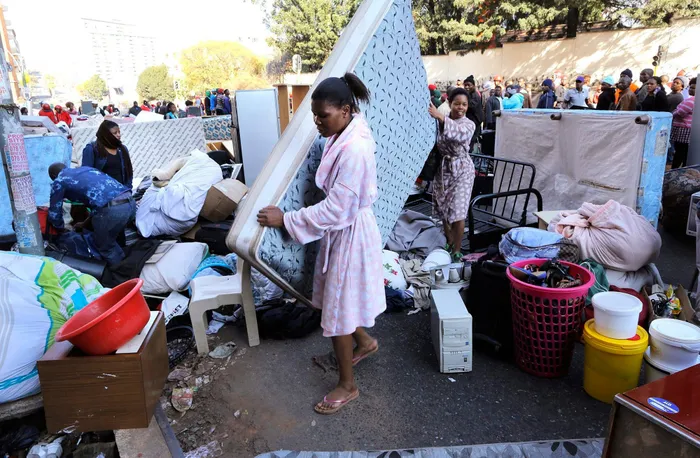Evictions in winter: How long must the poor suffer?

Picture: EPA/KIM LUDBROOK
By Wallace Mgoqi
Reading a recent story of about 20 families living on a state farm near Citrusdal in the Western Cape, fearing that they may be evicted by a state entity, the Agricultural Research Council leaves a chill down one’s spine.
It is reported that most of the families have lived on the farm for nearly three decades. While no formal process has started, residents are hoping that they will still be allowed to stay and that their living conditions on the farm will be improved.
The land in question is a 120-hectare “experimental farm “along the N7, called Proefplaas is owned by the Agricultural Research Council (ARC).
ARC falls under the Department of Agriculture Land Reform and Rural Development, the same department that has changed names, since 1994, what used to be the Department of Land Affairs (DLA). It is the principal agricultural research institution in South Africa.
The area of Citrusdal is the same place where the very first land restitution land claim was settled in 1996 for the community of Elandskloof, who were allowed to be at each other,s throats by all involved, until every useful thing on the farm was destroyed and a farm that was endowed with plentiful water from surrounding mountains benefitted white farmers, farming the below Elandskloof. To this day people there are living in squalor, yet they have very valuable land.
This case of Proefplaas is another lost opportunity, where land is in the hands of the government already. It would be a matter of ARC, itself an agricultural institution, mobilising the community, and resources that could lead to the land being used productively, profitably and sustainably.
It boggles the mind that instead of following the dictates of our Constitution, which enjoins government at local government level to adhere to developmental duties for the benefit of local communities. It states: “ A municipality must – a) Structure its administration and budgeting and planning processes to give priority to the basic needs of the community, and to promote the social and economic development of the community; and b) Participate in national and provincial development programmes.”
Now, this is the case where the Minister of DALRRD, Thoko Didiza should be jumping to stop this eviction, and re-direct the activities of the ARC towards helping this community in having the land vesting in them and using the land for development purposes. It is a no-brainer that such a step would be the right thing to do and benefit the ruling party, having regard to the fact that national elections are looming in a matter of months from now to 2024.
To prefer a single commercial farmer, as against a community of about 20 families is an insult to these poor people, who don't even have the financial resources to defend themselves against this looming eviction. It is the power of the Minister concerned to intervene decisively.
It would not only send a signal that the government cares about deepening poverty, high levels of unemployment and inequality, but it would also put this community on a new trajectory of taking care of themselves, from this generation to the next.
You ask yourself as to who has bewitched us, not to see opportunities that present themselves to us, not only to do good but also to build a lasting legacy? There is no shortage of knowledge and skills, and experience, even within the ARC to birth a development agricultural project that could be the pride of the nation, just as Elandskloof could have been and still can be if it were to be turned around. They would not be doing something beyond their expertise, but you ask: what makes them not do it, instead choose a shortcut of leasing the land to a commercial farmer?
How would a governing party go back, in a matter of 18 months, to the same community, to canvas for votes and pledge to govern them well? Who in that community would believe that, they would either be having very short memory or be naïve- our people are not so.
Those who govern will do well to always remember the truth that: “Governments are instituted among men, deriving their just powers from the consent of the governed, that whenever any form of government becomes destructive of these ends, it is the right of the people to alter or abolish it and to institute a new government, laying its foundation on such principles and organising its powers in such form, as to them shall seem most likely to effect their safety and happiness”.
There is One Who sees, Who saw a woman in the wilderness, with a young lad, crying for water, she was helpless but was directed to look next to where she was sitting, there was a well of water. He still sees us today and is urging us all to treat the poor with justice and humility.
How long must the poor in our midst wait for justice; how many more opportunities must slip through our fingers, before we can act justly?
Mgoqi is chairman at Ayo Technology Solutions Ltd. He writes in his personal capacity.
This article is original to The African. To republish, see terms and conditions.